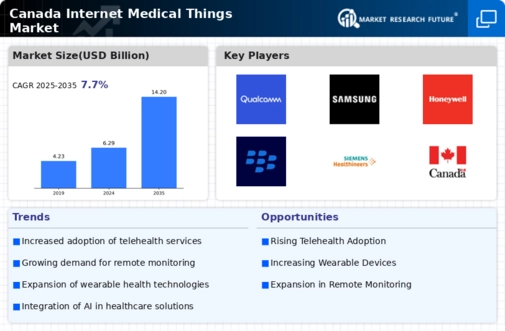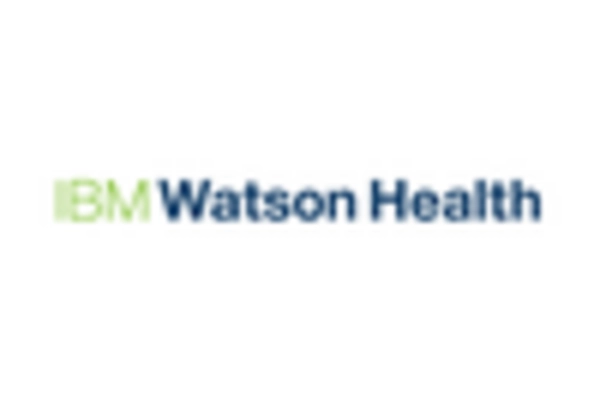Advancements in Internet Connectivity
The internet medical-things market in Canada is significantly influenced by advancements in internet connectivity. With the expansion of high-speed internet access, particularly in rural and underserved areas, healthcare providers can leverage internet medical technologies more effectively. Statistics indicate that over 90% of Canadians now have access to high-speed internet, facilitating the implementation of telehealth services and remote monitoring solutions. This improved connectivity allows for seamless data transmission between patients and healthcare professionals, enhancing the overall efficiency of healthcare delivery. As internet infrastructure continues to improve, the internet medical-things market is likely to expand, enabling more Canadians to benefit from innovative healthcare solutions.
Growing Focus on Preventive Healthcare
The internet medical-things market in Canada is increasingly shaped by a growing focus on preventive healthcare. As awareness of health and wellness rises, Canadians are more inclined to utilize technologies that promote proactive health management. This shift is reflected in the increasing adoption of wearable devices and health apps that track fitness, nutrition, and vital signs. Data suggests that nearly 40% of Canadians use some form of health tracking technology, indicating a strong market potential for internet medical solutions. By prioritizing preventive measures, the internet medical-things market is likely to expand, as consumers seek tools that empower them to take charge of their health and well-being.
Increasing Demand for Remote Patient Monitoring
The internet medical-things market in Canada experiences a notable surge in demand for remote patient monitoring solutions. This trend is driven by the growing need for continuous health monitoring, particularly among chronic disease patients. According to recent data, approximately 30% of Canadians live with chronic conditions, necessitating innovative solutions for effective management. Remote monitoring devices enable healthcare providers to track patients' vital signs in real-time, enhancing patient outcomes and reducing hospital visits. The convenience and efficiency of these technologies are likely to foster further adoption, as patients increasingly prefer to manage their health from home. Consequently, the internet medical-things market is poised for growth as healthcare systems adapt to these evolving patient needs.
Government Initiatives Supporting Digital Health
Government initiatives play a crucial role in shaping the internet medical-things market in Canada. Various federal and provincial programs aim to promote digital health solutions, providing funding and resources for the development of innovative technologies. For instance, the Canadian government has allocated over $100 million to support digital health initiatives, which include the integration of internet medical technologies into healthcare systems. These initiatives not only enhance access to healthcare services but also encourage collaboration between technology developers and healthcare providers. As a result, the internet medical-things market is expected to flourish, driven by supportive policies and funding aimed at improving healthcare delivery across the country.
Integration of Artificial Intelligence in Healthcare
The integration of artificial intelligence (AI) into healthcare is emerging as a transformative driver for the internet medical-things market in Canada. AI technologies enhance the capabilities of medical devices and applications, enabling more accurate diagnostics and personalized treatment plans. Recent studies indicate that AI can improve diagnostic accuracy by up to 20%, which is particularly beneficial in managing complex health conditions. As healthcare providers increasingly adopt AI-driven solutions, the internet medical-things market is expected to grow, offering innovative tools that enhance patient care. This trend suggests a future where AI and internet medical technologies work in tandem to revolutionize healthcare delivery in Canada.
















